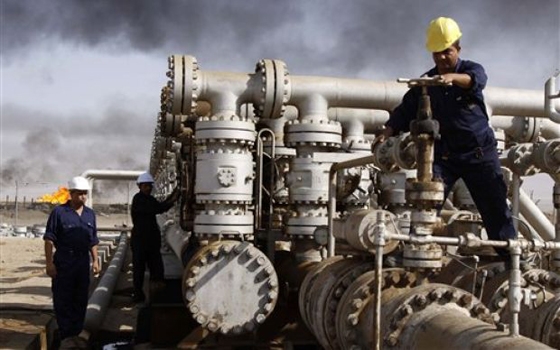A senior Iraqi official said his country expects to ramp up oil production to 4.5 million barrels per day by the end of next year from around 3.5 million barrels now, thanks to work by a handful of international oil companies developing the country's prized oil and gas fields.
The chairman of the prime minister's advisory commission, Thamir Ghadhban, also said that resource-rich Iraq, which sits atop the world's fourth largest proven reserves of conventional crude, is also aiming to produce 9 million barrels a day by 2020.
Oil revenues make up 95 percent of the country's budget.
Ghadhban, a former oil minister, made the comments at a ceremony in Baghdad to lay out a long-term energy plan that sets policies and recommendations to develop infrastructure, satisfy local demand, diversify the economy, create jobs and improve living standards.
The Integrated National Energy Strategy says Iraq needs to see $620 billion invested in its oil and gas and related industries through 2030. It suggests that Iraq could generate about $6 trillion based on an estimated price of about $100 for per barrel of oil.
Iraq has been struggling to develop its oil and gas reserves after years of war, international sanctions and neglect. Foreign companies with the resources and expertise were hesitant to come in after the 2003 U.S.-led invasion due to deteriorated security situation. But since 2008 when security situation started to improve, Iraq has awarded more than a dozen oil and gas deals to international energy companies such as U.S. Exxon Mobil, UK's BP, France's Total and others.
Since then, daily oil production increased remarkably from around 2.4 million barrels a day to around 3.4 million barrels a day now and exports from less than 2 million barrels a day to 2.4 million barrels a day now.
Although the plan was approved by the Cabinet in April, it is unclear if the government will be able to implement it.
Baghdad-based analyst and former planning minister Mahdi al-Hafidh said the plan is "very important" for the future of Iraq, but political infighting and instability could hamper it.
"There is no doubt that it is very important to guarantee political stability, to defuse political tension and to enable the government to have real authority all over the country," al-Hafidh told The Associated Press.
Associated Press
12 June












































































